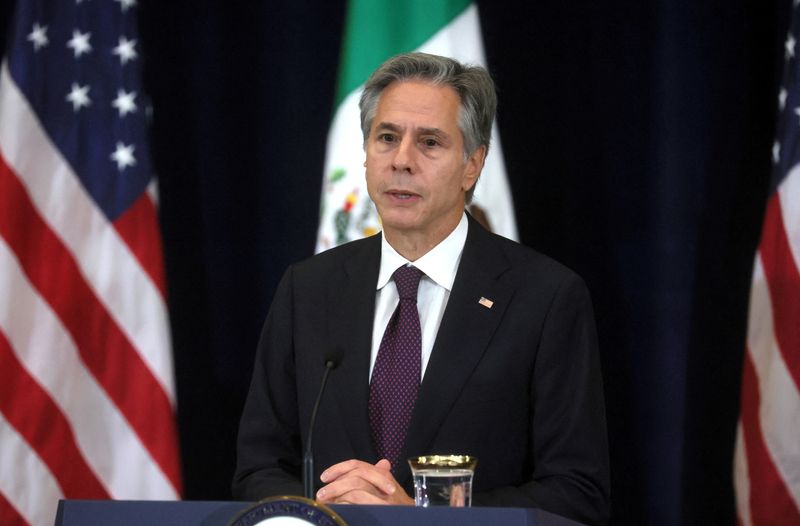By Michael Martina and Humeyra Pamuk
WASHINGTON (Reuters) -Early in the Biden administration, U.S. Secretary of State Antony Blinken vowed that the United States would only hold talks with China if they led to "tangible outcomes" to resolve disputes between the strategic rivals.
Two-and-a-half years later, that approach appears to have changed.
Since the start of the summer, the administration has embarked on a largely unreciprocated push to talk with Beijing, establishing working groups and sending three cabinet-level officials and its top climate envoy to Beijing.
The strategy, intended in part to salvage a relationship that fell to a dangerous level this year when the U.S. shot down a Chinese spy balloon, could lead to a meeting between U.S. President Joe Biden and Chinese President Xi Jinping in November, their first in a year.
"The goal truly is channels of communication and ensuring we don't veer into conflict - simple as that," said a senior Biden administration official. "Temperatures are lower than they were."
But critics say the approach carries its own risk: that the talks and working groups will only pull focus away from - and possibly delay - sanctions, export controls and competition.
"The return to high-level economic dialogues is a win for China, especially as Beijing continues to stonewall and gaslight on military risk reduction, cyber theft, and human rights," said Ivan Kanapathy, a former White House National Security Council deputy senior director for Asia.
HARD CONVERSATIONS
China is a daunting diplomatic challenge for the United States. The Biden administration wants to counter the country's growing military without provoking a conflict and to push back on what it considers unfair business practices while avoiding an all-out trade war.
Officials say they are imposing tough measures when necessary while reiterating that the U.S. is open for dialogue to keep relations stable.
They point to the high-tech sector, where the U.S. has imposed sweeping restrictions on the export of semiconductors and bans on U.S. investment in certain Chinese tech companies while offering new incentives for companies to expand instead in the United States.
"The criticism we get from some on (Capitol) Hill and some in the academic community, of course, is that competing means you can't talk to China," said the administration official.
"That is a fundamental misunderstanding of diplomacy. The hard, difficult conversations are always with competitors."
Those conversations, said the official, include explaining concerns that U.S. technology is being used to improve the capabilities of China's military.
When successful, such dialogue can also ease tensions.
One possible sign of a thaw is China's recent assistance with the return of Travis King, a U.S. soldier detained in North Korea and transferred back home through Chinese territory.
One area where even some of Biden's detractors would acknowledge U.S. success has been courting allies and partners, including summits with Southeast Asian countries and Pacific island leaders, a trilateral effort to bridge differences between Japan and South Korea, and the landmark AUKUS defense pact with the United Kingdom and Australia.
"We've had a real string of successes together with our significant investments at home that have put us, I think, in a strong position. And it's from that position that we engage the Chinese," a senior State Department official said.
Jacob Stokes, senior fellow in the Indo-Pacific Security Program at the Center for a New American Security, said the administration's China policy had been a success.
"The approach sends a signal to third parties—especially U.S. allies and partners—that Beijing, not Washington, is the recalcitrant actor and the one responsible for driving geopolitical tensions," Stokes said.
NO DELAY IN CHINA POLICIES
Nonetheless, the rush of visits by U.S. officials to China – intended in part to queue up a meeting between Biden and Xi at November's Asia-Pacific Economic Cooperation leaders summit in San Francisco – doesn't sit well with some critics and Republicans in Congress, who see stricter reciprocity as a wiser starting point.
A year of U.S. "diplomatic accommodation" has yielded no action to address market access for U.S. companies in China, theft of U.S. intellectual property, or Beijing's aggression in the disputed South China Sea, said Republican Congressman Mike Gallagher, who has run the House of Representative's select committee on China's Communist Party (CCP), often in close cooperation with Democratic lawmakers.
"Meanwhile, the administration has delayed, diluted or otherwise sacrificed defensive actions like tougher export controls or sanctions on CCP officials," he said.
Administration officials acknowledge China may see the U.S. push to engage as a chance to weaken or slow Washington's policies targeting China, particularly on exports in strategic industries such as semiconductors, but deny that this is happening.
They point to new fentanyl-related sanctions on China this week as evidence Beijing is not getting a pass, adding that long-delayed regulations to close loopholes on export controls to Chinese technology companies, such as Inspur Group, are coming soon.
The administration official denied the delays were to avoid upsetting China but were about "getting the technical pieces right, and balancing economic impact on our own domestic competitiveness."
Diplomats say engagement with China, while necessary, will rarely yield quick results.
A senior State Department official said the June visit to Beijing by Blinken - the first senior engagement since the spy balloon incident in February - helped reopen diplomatic channels even though it hasn't yielded tangible progress on issues such as restoring military-to-military communications, curbing fentanyl and reducing tensions in the South China Sea.

Still, said the official, those interactions have been important so that both sides can lay out clearly what their "bottom lines" are.
"This diplomacy is often very difficult. It’s often tense. Sometimes not particularly pleasant. But I think both sides believe it’s vitally important."